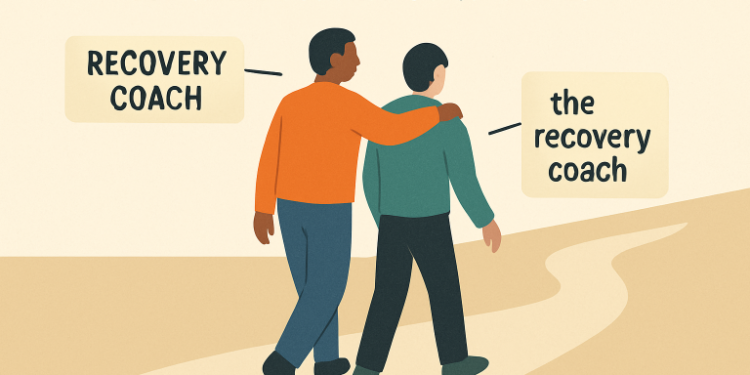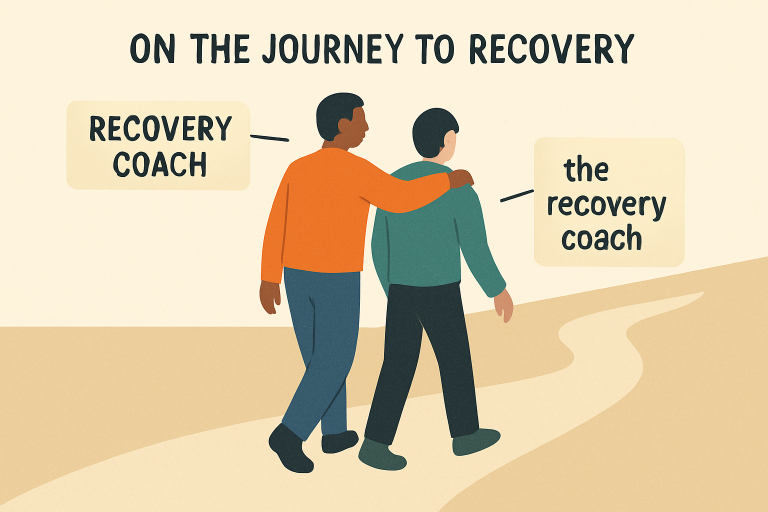How Professional Recovery Coaching Supports Long-Term Addiction Recovery

Embarking on the path to recovery from addiction is a courageous and challenging journey. While traditional treatment methods—like therapy and inpatient programs—form the foundation for recovery, ongoing support is often essential for sustained sobriety. Integrating support from a sober coach can have a transformative impact, offering a level of accountability and guidance that bridges the gap between clinical care and real-world challenges.
In this article, we examine the multifaceted role of recovery coaching in long-term addiction recovery, its distinctions from therapy, and how it can be effectively integrated into personalized treatment plans to support lasting change.
Table of Contents
Understanding Recovery Coaching
Recovery coaching is a client-centered, strengths-based support system designed for individuals seeking to overcome addiction and maintain recovery. Unlike counseling or therapy, a recovery coach does not provide clinical diagnosis or treatment. Instead, coaches act as mentors and allies, helping clients clarify their vision of recovery, set meaningful goals, and stay accountable to their commitments.
The guidance a recovery coach provides is rooted in real-life application. This individualized support may include assistance in establishing a daily recovery routine, developing coping strategies for triggers, or navigating the social and emotional complexities that arise after structured treatment. Recovery coaches typically meet with clients regularly and remain accessible by phone or text, offering ongoing encouragement between sessions.

Key Benefits of Recovery Coaching
- Personalized Support: Instead of a one-size-fits-all approach, recovery coaches begin by understanding each client’s specific needs, recovery goals, and challenges. This individualized attention makes it easier to stay motivated and adapt plans as life circumstances change.
- Accountability: Regular check-ins foster responsibility and commitment to the recovery process. Through frequent interaction, clients are more likely to stay on track and avoid relapse.
- Skill Development: Recovery coaching emphasizes life skill development—such as healthy communication, stress management, and time management—that enhances resilience and well-being well beyond initial recovery.
- Resource Navigation: Coaches help individuals connect with local and online resources, peer support groups, sober events, employment services, and healthcare providers to promote a holistic recovery plan.
Recovery Coaching vs. Traditional Therapy
While therapy and recovery coaching often complement each other, their core functions differ significantly. Therapists are trained professionals who address mental health issues, process past trauma, and explore the root causes of addiction—often using evidence-based modalities like cognitive-behavioral therapy or motivational interviewing. Recovery coaches, on the other hand, focus on solutions and action plans for daily living. Their interactions are future-focused, helping clients apply recovery skills to everyday life and keep moving forward. For many individuals in early or ongoing recovery, combining both forms of support—therapy for emotional healing and coaching for day-to-day navigation—can be particularly effective. Studies published by Psychology Today have demonstrated that this complementary approach reduces relapse rates and strengthens long-term outcomes.
Both therapy and recovery coaching play vital roles in the journey toward lasting wellness. By addressing various aspects of recovery, they establish a comprehensive support system tailored to individual needs.
Integrating Recovery Coaching into Treatment Plans
Incorporating recovery coaching into an existing treatment plan elevates the level of support available as individuals transition from inpatient to outpatient care or as they move toward complete independence. For example, many treatment centers today incorporate coaches into multidisciplinary teams, ensuring that clients receive ongoing encouragement, practical problem-solving, and real-world feedback after their clinical care ends.
Choosing the Right Recovery Coach
Finding the right recovery coach is crucial. Look for credentials such as national certification or prior experience in addiction recovery and treatment. A positive coaching relationship is built on trust, so personal compatibility, empathy, and clear communication are essential characteristics for success. Many clients benefit from consulting organizations dedicated to recovery support and seeking recommendations from peers or treatment providers to ensure a suitable fit.
Remember, a coach should not replace medical or psychological care, but rather enhance it by offering practical guidance, mentorship, and encouragement on the path to personal growth and sustained sobriety.
Conclusion
Professional recovery coaching plays a vital, often life-changing, role in the landscape of addiction recovery. By offering personalized support, real-life guidance, and ongoing accountability, a recovery coach empowers individuals to navigate the complex journey of sobriety with greater confidence, resilience, and hope for the future. Whether as an adjunct to traditional therapy or as a bridge between treatment and daily life, recovery coaching helps lay the foundation for long-lasting success.






